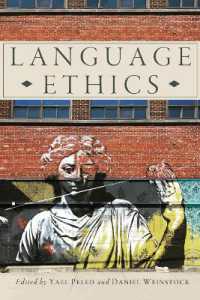基本説明
Contents: 1. Generating Terrorist Frames/ 2. Comparing Terrorism Frames/ 3. The Public's Response.
Full Description
Terrorism now dominates the headlines across the world-from New York to Kabul. Framing Terrorism argues that the headlines matter as much as the act, in political terms. Widely publicized terrorist incidents leave an imprint upon public opinion, muzzle the "watchdog" role of journalists and promote a general one-of-us consensus supporting security forces.
Contents
Introduction; Chapter 1 Framing Terrorism, Pippa Norris, Montague Kern, Marion Just; Part 1 Generating Terrorism Frames; Chapter 2 Terrorism, Censorship and the 1st Amendment, Doris A. Graber; Chapter 3 Clausewitz in the Age of CNN, Robin Brown; Chapter 4 Framing the Palestinian-Israeli Conflict, Tamar Liebes, Anat First; Chapter 5 Paramilitaries and the Press in Northern Ireland, Tim Cooke; Part 2 Comparing Terrorism Frames; Chapter 6 Framing the US Embassy Bombings and September 11 Attacks in African and US Newspapers, Todd M. Schaffer; Chapter 7 CNN and al Jazeera's Media Coverage of America's War in Afghanistan, Amy E. Jasperson, Mansour O. El-Kikhia; Chapter 8 Framing Muslim-Americans Before and After 9/11, Brigitte L. Nacos, Oscar Torres-Reyna; Chapter 9 Framing World Opinion in the Elite Press, Frank Louis Rusciano; Part 3 The Public's Response; Chapter 10 Explaining 9/11*This analysis is based on data collected with support from the Institute for Social Research, the Russell Sage Foundation, and the Howard R. Marsh Center for the Study of Journalistic Performance in the Department of Communication Studies at the University of Michigan. The analyses are the sole responsibility of the authors. This paper benefited from conversations with our colleagues Paul Huth and Doug Lemke and the comments of participants in the symposium "Restless Searchlight: Terrorism, the Media, and Public Life," held at Harvard University, August 28, 2002. We gratefully acknowledge the research assistance of Eric Groenendyk and Heather Colleen Schaar., Michael W. Traugott, Ted Brader; Chapter 11 Public Opinion Among Muslims and the West, Pippa Norris, Ronald Inglehart; Chapter 12 Rallies All Around, Paul Brewer, Sean Aday, Kimberly Gross; Chapter 13 Fear and Terrorism, Leonie Huddy, Stanley Feldman, Gallya Lahav, Charles Taber; conclusion1 Conclusion; Chapter 14 The Lessons of Framing Terrorism, Montague Kern, Marion Just, Pippa Norris;







